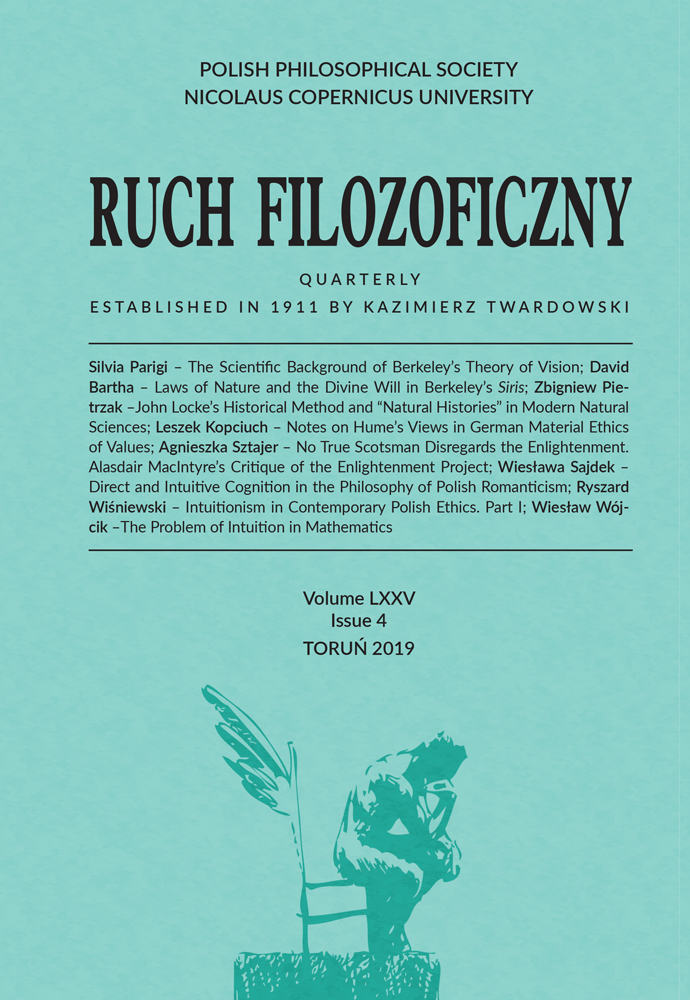Laws of Nature and the Divine Will in Berkeley’s Siris
DOI:
https://doi.org/10.12775/RF.2019.057Słowa kluczowe
Berkeley, Siris, laws of nature, voluntarism, divine psychologyAbstrakt
In this paper, I argue that Berkeley was a theological voluntarist in the Siris. I define theological voluntarism as the view that the divine will has conceptual priority over the intellect, implying serious ramifications for the modal status of the laws of nature. I identify four theses that are required to call Berkeley a full-blown voluntarist and show that we find all of them in the Siris: (i) God’s indifferent, arbitrary and free will enjoys conceptual priority over his intellectual functions; (ii) nature is directly guided by, and its laws are grounded in, God’s will, meaning not only that physical things have no causal powers or essences which could ground the laws of nature; but also that (iii) God creates and maintains the physical world in accordance with law-like patterns of the phenomena arbitrarily established by particular divine volitions. As a consequence, (iv) whatever we can know about the metaphysically contingent laws of nature we know through induction from our limited experience. The Siris is particularly interesting from the perspective of voluntarism underlying these views, as, due to the alleged discontinuities with the early works and its Platonic tendencies in general, it seems to be the worst candidate for such an interpretation. In what follows, my principal aim is to show how wrong this appearance is, and that the voluntarist views Berkeley put forward in the Siris concerning the divine nature, the God-world relation, the laws of nature and the proper scientific methodology link it very naturally to his earlier considerations.Bibliografia
Airaksinen Timo. 2010. “Berkeley and Newton on Gravity in Siris”. In: George Berkeley: Religion and Science in the Age of Enlightenment, ed. Silvia Parigi. 87–106. Dordrecht: Springer.
Ayer Michael. 2005. “Was a Berkeley an Empiricist or a Rationalist?”. In: The Cambridge Companion to Berkeley, ed. Kenneth Winkler. 34–62. Cambridge: Cambridge University Press.
Astell Mary. 1705. The Christian Religion, as profes’d by a Daughter of the Church of England. London: S. H. for R. Wilkin.
Berkeley George. 1948–1957. The Works of George Berkeley. 9 Vols., eds. A. A Luce and T. E. Jessop. London: Thomas Nelson. (Referred to as Works, reference is by volume and page number).
Brook Richard. 1973. Berkeley’s philosophy of science. The Hague: M. Nijhoff.
Buchdahl Gerd. 1969. Metaphysics and the philosophy of science: the classical origins Descartes to Kant. Oxford: Basil Blackwell.
Downing Lisa. 1995. “Siris and the Scope of Berkeley’s Instrumentalism,” The British Journal for the History of Philosophy 3: 279–300.
Downing Lisa. 2005a. “Berkeley’s Natural Philosophy and Philosophy of Science”. In: The Cambridge Companion to Berkeley, ed. Kenneth Winkler. 230–265. Cambridge: Cambridge University Press.
Downing Lisa. 2005b. “Occasionalism and Strict Mechanism: Malebranche, Berkeley, Fontenelle”. In: Early Modern Philosophy: Mind, Matter, and Metaphysics, eds. Christia Mercer and Eileen O’Neill. 206–230. Oxford: Oxford University Press.
Garber Daniel. 1982. “Locke, Berkeley, and Corpuscular Scepticism”. In: Berkeley: Critical and Interpretative Essays, ed. C. M. Turbayne, 174–193. Minneapolis: University of Minnesota Press.
Hight Marc A. 2010. “Berkeley’s Metaphysical Instrumentalism”. In: George Berkeley: Religion and Science in the Age of Enlightenment, ed. Silvia Parigi. 15–29. Dordrecht: Springer.
Leibniz Gottfried Wilhelm. 1989. Philosophical Papers and Letters. A Selection: A Selection Translated and Edited, with an Introduction by Leroy E. Loemker. 2nd edition. Dordrecht: Kluwer Academic Publishers.
Leibniz Gottfried Wilhelm. 1952. Theodicy, trans. E. M. Huggard. New Haven: Yale University Press.
Locke John. 1975. An Essay Concerning Human Understanding, ed. Peter H. Nidditch, Oxford: Clarendon Press. (Reference is by book, chapter and section).
Moked Gabriel. 1971. “A note on Berkeley's corpuscularian theories in Siris”. Studies in History and Philosophy of Science, vol. 2 (3): 257–27.
Moked Gabriel. 1986. “Two Central Issues in Bishop Berkeley’s ‘Corpuscularian Philosophy’ in the Siris”. History of European Ideas 7: 633–641.
Moked Gabriel. 1988. Particles and Ideas: Bishop Berkeley’s Corpuscularian Philosophy. Oxford: Clarendon.
Newton Isaac. 1962. Unpublished Scientific Papers of Isaac Newton, eds. A. Rupert Hall and Marie Boas Hall. Cambridge: Cambridge University Press.
Newton Isaac. 1999. The Principia. Mathematical Principles of Natural Philosophy. A New Translation by I. Bernard Cohen and Anne Whitman assisted by Julia Budenz. Berkeley, Los Angeles, London: University of California Press.
Ott Walter. 2019. “Berkeley’s Best System: An Alternative Approach to Laws of Nature”. Journal of Modern Philosophy 1 (1), 4: 1–13.
Pearce Kenneth. 2017. Language and the Structure of Berkeley’s World. Oxford: Oxford University Press.
Peterschmitt Luc. 2009. “Can Berkeley Be an Instrumentalist? Towards a Reappraisal of Berkeley’s Philosophy of Science”. Berkeley Studies 19: 19–31.
Schmaltz Tad M. 2008. “Occasionalism and mechanism: Fontenelle’s objections to Malebranche”. British Journal for the History of Philosophy 16 (2): 293–313.
Stoneham Tom, Angelo Cei. 2009. “Let the Occult Quality Go: Interpreting Berkeley’s Metaphysics of Science”. European Journal of Analytic Philosophy Vol. 5. no. 1: 73–91.
Stoneham Tom. 2018. “Action, knowledge and embodiment in Berkeley and Locke”. Philosophical Explorations, vol. 21 (1): 41–59.
Wilson Catherine. 1994. “Berkeley and the Microworld”. Archiv für Geschichte der Philosophie 76: 37–64.
Winkler Kenneth. 1989. Berkeley: An Interpretation. Oxford: University Press.
Pobrania
Opublikowane
Jak cytować
Numer
Dział
Statystyki
Liczba wyświetleń i pobrań: 435
Liczba cytowań: 0



